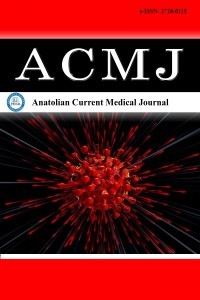Oruç tutan diyabet hastalarının oruç esnasında gelişen istenmeyen olaylarına geriye dönük bakış
Amaç: Tip 2 diyabet ülkemizde artan, ciddi bir sağlık sorunu olmaya devam etmektedir. Günlük hayatın bir parçası olan oruç ibadetini yapmak diyabet hastaları tarafından da talep edilmekte ve hekim görüşü istenmektedir. Bu çalışmada oruç tutan diyabet hastalarının yaşadığı istenmeyen olay sıklığı araştırılmak istenmiştir. Gereç ve yöntem: 2018 yılı ay takvimine göre Ramazan ayında oruç tutmuş ardından Kırıkkale Üniversitesi Tıp Fakültesi İç hastalıkları polikliniğine başvuran 30 hasta değerlendirildi. Hipoglisemi, hipoglisemi semptomu, presenkop, senkop, dehidratasyon, hipotansiyon, ciddi ağırlık kaybı veya kendilerinin tariflediği herhangi bir yakınma olup olmadığı sorgulandı. Hastane veya acil servis başvuruları sorgulandı. Hastaların yaşları ve HbA1c düzeyleri irdelendi. Ramazan öncesi hekim görüşü alıp almadıkları soruldu.Bulgular: Ortanca yaş 53, ortanca HbA1c:7,3 olan 11 erkek, 19 kadın hasta değerlendirildi. Hastaların iki tanesinde hipoglisemi, bir tanesinde kan şekeri normalken hipoglisemi semptomu olduğu öğrenildi. Diğer istenmeyen olaylar gözlemlenmedi. Hipoglisemi saptanan hastaların hekim görüşü almadan eski tedavilerine devam ettikleri öğrenildi. Sonuç: Oruç tutmak isteyen diyabet hastalarının risk grubunun belirlenerek, hastaya uygun bireysel tedavilerin uygulanması ve yakın takip edilmesi istenmeyen olayların yaşanmaması için yararlı olacaktır.
Anahtar Kelimeler:
Ramazan, oruç, diyabet, hipoglisemi
Retrospective view on the adverse events of diabetic patients during fasting
Aim: Type 2 diabetes prevalence continues to increase and the disease is still healthcare problem. Fasting, which is a part of daily life, is demanded by diabetics and the opinion of the physician is requested. In this study, it was aimed to investigate the frequency of adverse events experienced of diabetic patients by fasting.Material and Method: After 2018 Ramadan, 30 patients that were admit to Kırıkkale University Medical Faculty Internal Diseases outpatient clinic were evaluated. Hypoglycemia, symptoms of hypoglycemia, presyncope, syncope, dehydration, hypotension, severe weight loss, or any symptoms they described were questioned. Hospital or emergency room applications were questioned. Patients' ages and HbA1c levels were examined. Before Ramadan, they were asked whether they received a doctor's opinion.Findings: Median age was 53, median HbA1c was %7.3. Eleven male and 19 female patients were evaluated. Two patients had hypoglycemia and one had hypoglycemia symptoms. No other adverse events were observed. It was learned that the patients who had hypoglycemia continued their old treatment without taking the physician's opinion. Conclusion: It is useful to determine the risk group of diabetic patients who want to fast, and to follow up closely about the appropriate individual therapies for avoiding any adverse events.
Keywords:
Ramadan, fasting, diabetes, hypoglycemia,
___
- 1. Beshyah SA. Fasting during the month of ramadan for people with diabetes: Medicine and fiqh united at last. IJMBS; 2009;1:58–60.
- 2. Ghani F. Most Muslims say they fast during Ramadan. 2013. Available at http://www.pewresearch.org/fact-tank/2013/07/09/global-median-of-93-of-muslims-say-they-fast-during-ramadan
- 3. Al-Arouj M, Assaad-Khalil S, Buse J, et al. Recommendations for management of diabetes during Ramadan: update 2010. Diabetes Care 2010; 33: 1895-902
- 4. Ghouri N, Hussain S, Mohammed R et al. BMJ Open Diabetes Res Care. 2018 ; 6:e000520
- 5. El Toony LF, Hamad DA, Omar OM . Outcome of focused pre-Ramadan education on metabolic and glycaemic parameters in patients with type 2 diabetes mellitus. Diabetes Metab Syndr. 2018;12:761-767
- 6. Bashir M, Elhadd T, Ali H et al . A pilot study using flash continuous glucose monitoring in patients with type-2 diabetes on multiple anti-diabetic agents during Ramadan. Diabetes Metab Syndr. 2018;12:965-968
- 7. Bashier A , Khalifa AA , Abdelgadir EI et al. Safety of Sodium-Glucose Cotransporter 2 Inhibitors (SGLT2-I) During the Month of Ramadan in Muslim Patients with Type 2 Diabetes. Oman Medical Journal. 2018; 33: 104-110
- 8. Shao Y, Lim GJ, Chua CL et al. The effect of Ramadan fasting and continuing sodium-glucose co-transporter-2 (SGLT2) nhibitör use on ketonemia, blood pressure and renal function in Muslim patients with type 2 diabetes. Diabetes Res Clin Pract. 2018; 142 :85-91
- 9. Mohan V, Kalra S, Kesavadev J. Consensus on Initiation and Intensification of Premix Insulin in Type 2 Diabetes Management. J Assoc Physicians India. 2017; 65: 59-73
- Yayın Aralığı: Yılda 4 Sayı
- Başlangıç: 2019
- Yayıncı: MediHealth Academy Yayıncılık
Sayıdaki Diğer Makaleler
Sarkomatoid renal hücreli karsinom: olgu sunumu ve literatürün gözden geçirilmesi
Engin KÖLÜKÇÜ, Faik Alev DERESOY, Nihat ULUOCAK, Doğan ATILGAN, Özge GÜMÜŞAY, Murat BEYHAN, Şahin KILIÇ
Bal: kısa tıbbi bakış ve kronik yara bakımı
Oruç tutan diyabet hastalarının oruç esnasında gelişen istenmeyen olaylarına geriye dönük bakış
Sağlık personeline uygulanan kızamık-kabakulak-kızamıkçık aşısının yan etkilerinin değerlendirilmesi
Birgül KAÇMAZ, Ayşegül TUNA, Serdar GÜL, Okan ÇALIŞKAN, Gökçe AYVAZ, Burçin TUNCEL, Cemal BULUT, Selver KANDEMİR
Petröz apisit tanılı iki olgunun manyetik rezonans görüntüleme bulguları
Yunus YILMAZSOY, Selmin Perihan ERKMEN
